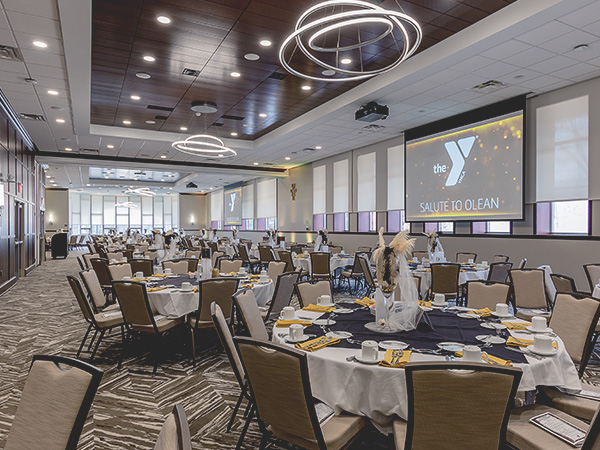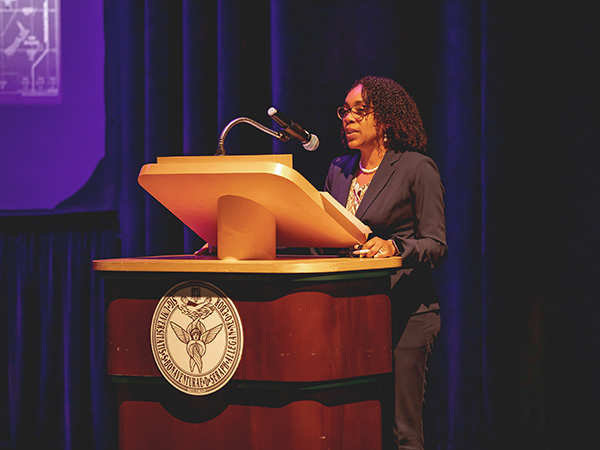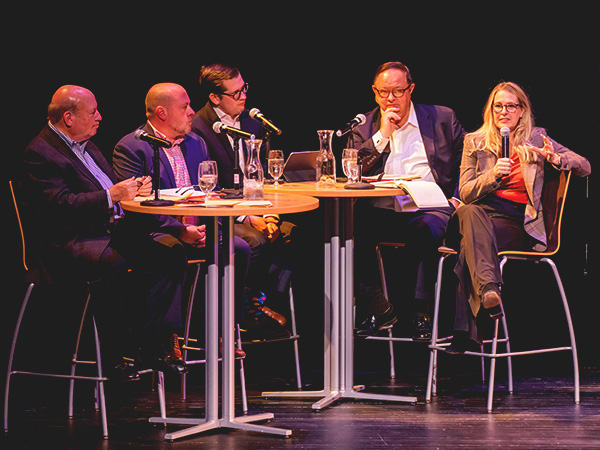




A well-planned corporate event brings people together in creative ways and leaves a lasting impression, but a haphazard one will have people looking for the door.
Whether you’re holding a trade show, gala, board meeting or award ceremony, engaging and inspiring attendees is a significant undertaking filled with countless little details. To ensure your corporate event is set up for success, we’ve made an easy to reference corporate event planning checklist.
 8-12 months out
8-12 months outThis will provide a clear direction for your corporate event planning, which will guide your decisions throughout the entire process.
A rough budget will help you estimate the overall cost of the event and ensure you can stay within a set cost.
To guide you:
Make sure there is room for a contingency. There will always be an unexpected expense that comes up, whether it is extra rental tables or a last-minute menu addition.
You can’t plan an event without a date! When selecting, keep in mind holidays, vacations, community events to avoid potential scheduling conflicts.
Here are some tips for picking a strong date:
The venue will ultimately depend on the size of your event. But it’s also important to consider options that offer everything you need and don’t want to outsource. For example, if you don’t want to work with a catering company, then you should search for an event venue that offers in-house catering services.
To help you choose the perfect venue, ask yourself the following questions:
You can also schedule venue tours to help narrow down your selection. Think about the location and travel time for your guests. Make sure it’s accessible for the type of audience you are planning to accommodate.
A theme sets the tone for your corporate event and can drive home your overall purpose and message. The format, whether in-person, virtual or hybrid, also impacts decisions made along the way.
To guide you:
Your guest list should align with the goals of your program. For example, if you’re hosting an awards ceremony, all honorees should be invited. A guest list will help you ensure the number of guests is within your budget as well.
To guide you:
When all the above is settled, you can move onto the physical invite, which should include the most important information including date, time, location and agenda.
A strong speaker can keep your guests engaged while also reinforcing your event’s purpose. Unless you are planning your event 2-3 years in advance, your dream speaker may already be booked. So it’s important to approach this task with an open mind.
To help with your search, you can:
Sponsors can help provide support and resources to your event, including cash donation and merchandise. Securing a sponsor can also help increase your reach and broaden your audience.
To guide you:
 3-4 months out
3-4 months outOnce you have the foundation, you can start confirming the details of your corporate event.
All speakers should be confirmed 3-4 months out to provide them with enough time to prepare their presentations. This also gives you the time to determine the A/V and stage setup. You can also obtain bio information and photos and arrange any necessary travel accommodations.
This is a good time to review your budget and make any necessary changes to keep you within it. You should also finalize your sponsor contributions as well as your ticket prices.
When setting a ticket price, consider the following:
A website is a centralized location where attendees can find information and updates about your event. It can also create a strong brand presence and increase visibility.
Whether it’s physical invites in the mail or a digital version via email, you will want to alert attendees of your invite. The invitation should include all pertinent information such as the date, time and location of your event, plus how you’d like people to RSVP.
You have an event, now make sure people attend it!
When promoting your corporate event, you could do the following:
Room arrangements play an important role in how attendees will participate in your event. From half-moon to theater to living room-style, it’s recommended that you work closely with your event management team to determine what layout will keep everyone engaged throughout the program.
Decide if the space requires any additional equipment such as dance floors, podiums or tents to further elevate the experience.
Guests always remember the food! It’s important to work closely with the catering team to determine a menu that will keep everyone energized throughout the day while meeting all dietary restrictions.
Make sure all presentations, video conferencing and guest speakers are powered for success with a well-rounded A/V package.
In order to manage your time effectively, it’s recommended that you create a sample schedule that allows you to make necessary adjustments.
To guide you:
 2 months out
2 months outYour event is almost here! It’s time to build excitement and conduct one more push for registration (if you haven’t sold out yet)!
Reminders help boost attendance and convey critical information about your event.
Better handle curveballs by doing the following:
 The week before
The week beforeDot your i’s and cross your t’s for the final big push before your event.
Review and revise your schedule and script and make any last minute adjustments. Then, get the final sign-off from necessary parties.
This number will affect many aspects of your event, from seating to the amount of food your caterer will need to order so it’s important to share that final count.
Include any last minute expenses to your budget sheet. You can also compare the final amount against the projected expenses. It’s perfectly acceptable if you have differences here and there, but what’s important is having a final record.
Keep an open line of communication with guests. Inform them of any changes.
If this corporate event planning checklist seems like a lot of responsibility, that’s because it is! But St. Bonavenue is here to help! Our dedicated event management team can guide you every step of the way. We offer on-site catering, A/V services, equipment rentals and lodging for a seamless event experience.
Talk to us about your event today! We will work hard to bring your unique taste, style and budget together for an event that leaves a lasting impression on your guests.